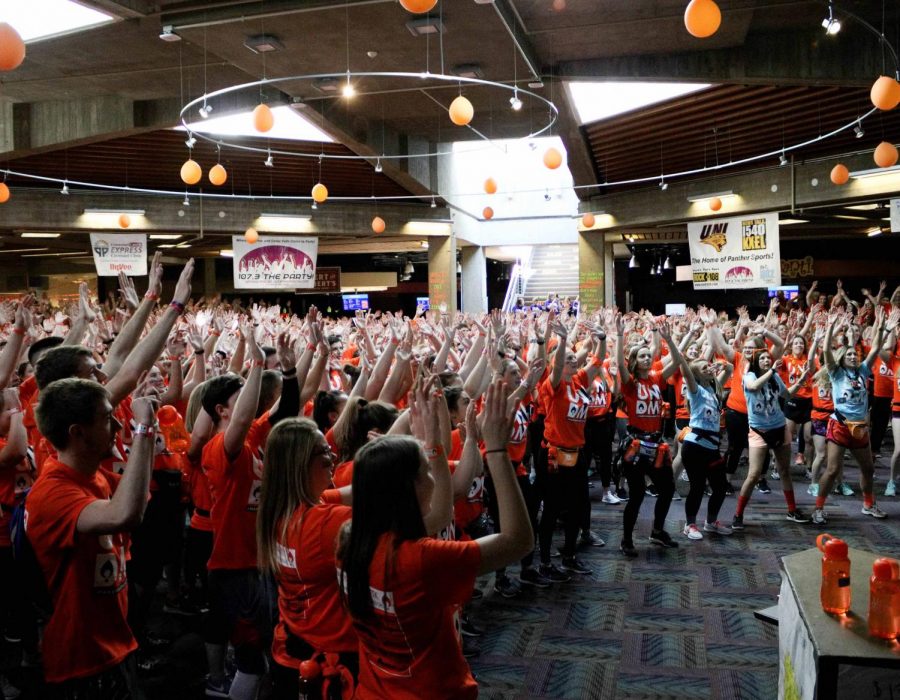Dance Marathon must get political
Opinion columnist Caleb Stekl believes that Dance Marathon should advocate for a political system that he sees would solve the issues that they raise money for to begin with.
Feb 18, 2019
The perennial “For the Kids” (FKT) charity event evokes images of orange shirts, loud music, dancing and Instagram posts. The 24-hour dance event is a time of celebration, happiness and joy. FTKers get a sense of immense satisfaction that they have done something worthwhile for those in need. They have helped make the world a better place. While others complain and rabble about politics and economics, we, the FTKers, we’re pragmatic. We put our money where your mouth is.
Opposed to this rose-y picture of the event, my claim is a simple one: FTK is a sham. It is not ‘For the Kids.’
Let’s examine the cultural and social logic working within the event.
On the one hand, we have the causes necessitating FTK: children’s illness, medical bills and expensive healthcare not covering the massive costs of extended hospital stays. On the other, we have the aesthetic created by those involved: Snapchat stories, Instagram celebrations and lots of smiling faces. How do we reconcile these two diametrically opposed pictures of the struggle to pay for medical care? Children’s cancer wards are not filled with balloons and raves. For every parent that receives a check from FTK, thousands more receive no help at all. What exactly is being celebrated at the precipice of FTK, the 24-hour dance marathon? What exactly are you cheering for?
The amounts raised by FTK throughout the nation represent only a sliver of the medical debt incurred by parents and families each year. If you’re going to dance and sing about all the good you have done, then you also need to dance and sing for those you haven’t helped. The only ethical way to perform after raising money for children with cancer is a profound sense of guilt, a troubling anxiety. We should now ask the question: who are you really dancing for? Is it ‘For the Kids,’ or is it ‘For Me,’ so that I can say ‘I’m a good person, I helped?’ This is not to say that FTK does no good. The millions raised by the nationwide event do help people, and it’s a nice gesture of solidarity to those in need.
However, the limit of FTK’s utility is inscribed in its very structure. It cannot solve the problem which it is premised upon. FTK does not even attempt to ask the question of its own cause. Namely, what about our political and economic structure requires us to raise money? Why don’t people have the funding they need to ensure their child doesn’t die? We can confidently say that FTK is strictly apolitical. There are no political demands either from the event as an organization or the individuals involved. Medicare for All (M4A), on the other hand, can and would solve the problem. M4A demands universal healthcare free of charge at the point of service. Parents would not have to depend on FTK, working class individuals would not have to hysterically create GoFundMe pages to supplement their poor insurance and we could all rest well knowing an illness won’t bankrupt our families. That should be the demand of FTK.
Instead, of dancing and singing with your friends and posting Instagram stories of the great time you’re having, demand a political system where FTK does not exist.



















Aaron • Feb 20, 2019 at 10:45 am
This is pretty disrespectful. You can’t criticize something that you know minimal information about. Pretty disappointed in the newspaper that they didnt look at this before publishing.
Elizabeth Bullock • Feb 19, 2019 at 10:14 am
As a former UNI student and DM alumni, I am sad that the Northern Iowan has allowed this column with so many inaccuracies about the student organization be “in print”. This article refers to “FTK” as it is an organization, and not the tag line that dance marathon used it as. The whole organization is Children’s Miracle Network. I understand that we all have a stance on politics and I’m not mad that someone chose to speak about theirs – I’m mad that he had to write an incredibly inaccurate article that drags dance marathon under the bus.
Kaitlyn • Feb 18, 2019 at 2:10 pm
Let’s talk about your article and the hatred you seem have for people working to help others. These students do more than just dance; they have to request donations as well. If you have ever done that, which I’m guessing you probably have not, you would understand the challenge that can be. These are students with busy lives that take time from their busy schedules to help others in need, a terrible thing to do in your words.
Next, let’s talk about your Medicare for All, more simply stated, government run healthcare. The government runs the DMV, and I’m sure you’ve always had a good experience there, with short waits and people that genuinely care about their jobs and the people they are serving. If you have, you are probably the only one.
With your Government run healthcare, how much does it cost and who pays for it? Oh that’s right; the taxpayers pay for it. Since it will be run by the government, there’s no doubt it’ll be run inefficiently so that the overall costs for our “free” healthcare will be significantly more; so how much? I don’t know, but in Canada, the average family of 4 pays $1000/ month for their “free” healthcare. They often end up coming to the US to pay for healthcare due to the long waits in Canada. Don’t take my word for it– look it up.
Please remember when you have a third party (the government) paying for other peoples healthcare, neither cost nor quality matters to them. Simply stated, the cost is extremely high and the quality is terrible.
Is that what you really want? If you do please go to another country with “free” healthcare and write an article about that when you get back. I’d recommend Venezuela or Cuba.